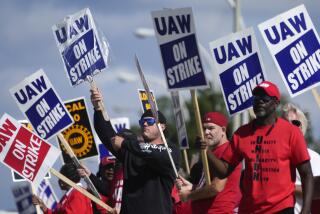Stock Buybacks Face Increasing Scrutiny
- Share via
After shares of Tenet Healthcare Corp. plunged nearly 50% in a week, the hospital company resorted to a corporate strategy common in times of crisis: It used its own cash to buy the stock in the open market, spending at least $140 million in the five days ended Nov. 15.
Tenet said the message was that the stock’s collapse, in the wake of a federal investigation of the company’s billing practices, was “overdone.” If the share price revives, the company’s buyback may look like a smart move. But if the price sinks further, shareholders may wish their capital hadn’t been wasted.
Stock buybacks, a favorite management use of cash during the bull market of the late 1990s, nowadays face a much more critical review by shareholders -- a trend that may become more pronounced if tax-law changes boost the appeal of cash dividend payments.
A buyback program is supposed to be an indication that management believes its share price is undervalued, and that the stock is the best investment the company can identify at the moment.
In theory, a buyback can help boost a stock’s price two ways -- first, as the company enters the market to snap up the shares, and second if the purchases reduce the number of shares outstanding, thereby raising the company’s per-share earnings over time.
But many companies were announcing hefty buyback programs in 1999 and early 2000, as the stock market was cresting. The bear market since has made many of those purchases appear misguided.
More troubling to many institutional shareholders is that some companies have been buying back stock only to supply the shares needed for management stock option plans, said Robert Willens, a tax expert at brokerage Lehman Bros. in New York. If a company’s outstanding share total hasn’t declined much despite years of buybacks, it’s legitimate to ask which party -- management or shareholders -- is the true target beneficiary of a buyback program, Willens said.
Still, some companies have used buybacks to aggressively reduce the number of shares outstanding, said David Fried, a Pacific Palisades money manager and publisher of Buybackletter.com, which tracks buyback programs to identify appealing stocks.
He cites Deluxe Corp., the nation’s leading check printer. The company has cut the number of shares outstanding to about 61.8 million from 81 million in 1998. The stock price has soared 116% since the end of 2000, helped in part by investors’ renewed respect for fundamentally strong businesses.
Fried argues that buybacks can be a very effective tool in boosting shareholder value, if the programs indeed reduce outstanding shares.
He agrees that shareholders are much more likely to scrutinize the wisdom of buyback programs now, but says that may make newly announced programs more meaningful -- “because everybody’s being more careful.”
Given record-low short-term interest rates at a time when many stocks remain near multi-year lows, it may even make sense for more companies to borrow to buy back stock, Fried said.
But if Congress changes tax laws to make dividends more attractive to investors, corporate managers could face a clamor to use excess cash for dividends rather than share buybacks.
Even without a shift in the tax code, the shareholder argument for dividends over stock buybacks is that a dividend, once set, becomes a serious commitment for management to meet each quarter.
Buybacks, by contrast, can be announced with great fanfare, but managers may or may not follow through on those plans.
A joke that has circulated on Wall Street is that buybacks of shares are the equivalent of dating, whereas a dividend is the equivalent of marriage.
More to Read
Inside the business of entertainment
The Wide Shot brings you news, analysis and insights on everything from streaming wars to production — and what it all means for the future.
You may occasionally receive promotional content from the Los Angeles Times.










